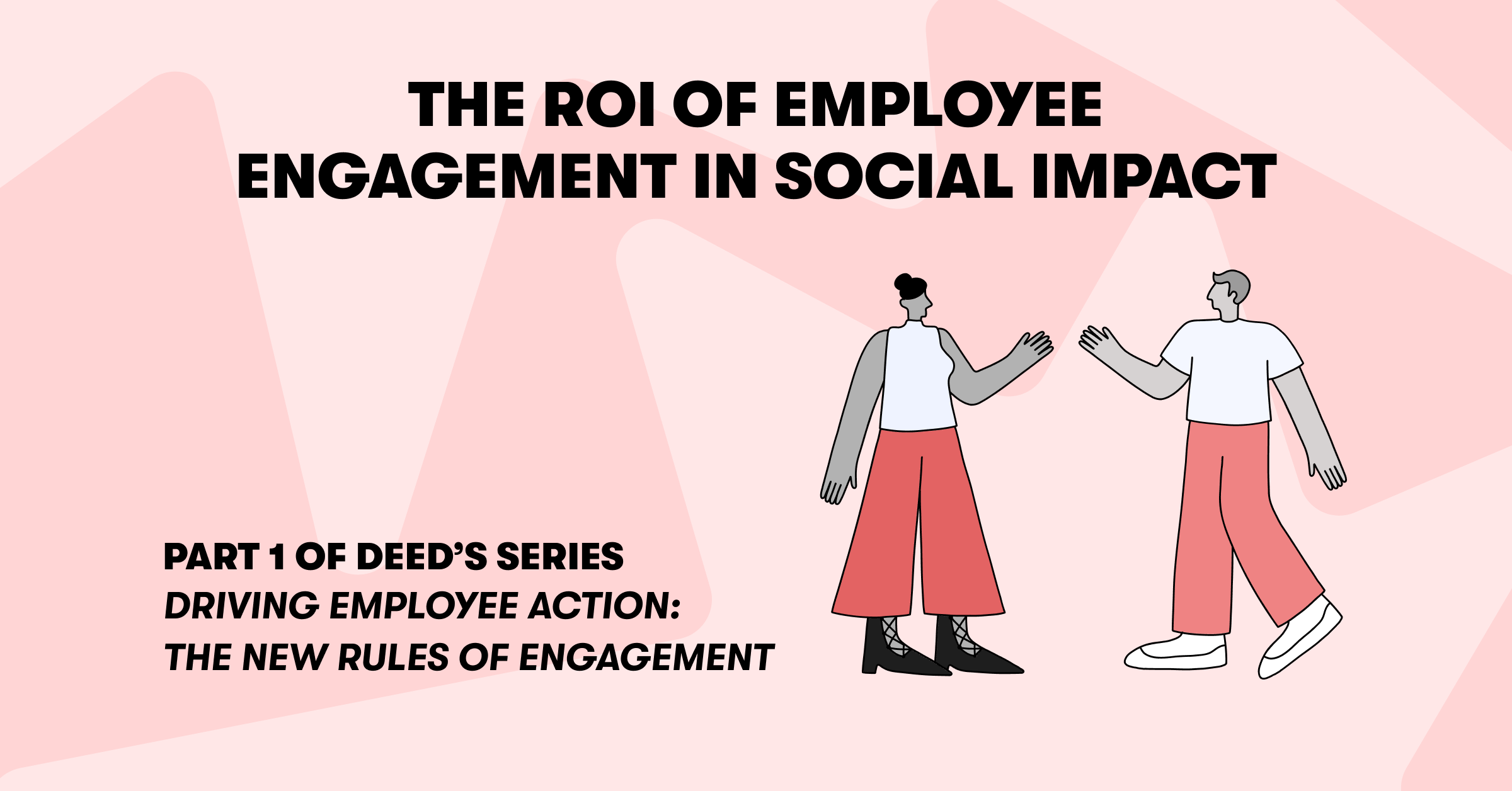Beyond Volunteering — How to Empower Employees as Changemakers
Part 5 of Deed’s Driving Employee Action: The New Rules of Engagement Series
Employee engagement is changing—and so are employee expectations. Today’s workforce wants more than participation—they want purpose, agency, and the ability to drive change.
At Deed, we believe that empowering employees through social impact isn’t just good for morale—it’s a business strategy. The most forward-thinking companies are reimagining volunteering, unlocking new forms of giving, and scaling purpose across regions and generations.
In Deed’s latest series - Driving Employee Action: The New Rules of Engagement - we explore the new rules of engagement: how to activate employees as changemakers, design modern programs that reflect how people want to give back, and turn social impact into a driver of loyalty, culture, and long-term ROI.
Redefining Employee Engagement
Traditional volunteering has long been a pillar of corporate social responsibility (CSR) programs. But today’s workforce wants more than a day of service—they want to drive change in ways that are personal, skilled, and scalable.
Deed’s data shows that the highest-performing programs aren’t just about hours logged—they’re about empowerment. In this post, we’ll explore how forward-thinking companies are going beyond volunteering to help employees become true changemakers.
From Volunteers to Changemakers: What’s the Difference?
A volunteer:
- Participates in pre-organized activities
- May engage only occasionally
- Often plays a supporting role
A changemaker:
- Identifies problems and proposes solutions
- Leverages their unique skills and networks
- Drives impact with or without a formal program
Empowering changemakers means giving employees the autonomy, tools, and support to lead.
Ways to Empower Employee Changemakers
- Launch Skills-Based Volunteering Programs
- Partner with nonprofits that need design, marketing, data, or tech skills (using Deed’s volunteer library!)
- Allow employees to work on projects that match their professional abilities
- Recognize skills-based efforts in performance reviews and company meetings
- Fund ERG-Led Impact Projects
- Give Employee Resource Groups (ERGs) budget and decision-making power
- Let identity-aligned groups lead social justice or community campaigns
- Host Innovation Challenges
- Invite teams to pitch impact ideas aligned to your mission
- Provide grants or volunteer time off (VTO) to implement winning ideas
- Create Micro-Action Libraries (or use Deed’s!)
- Not every employee has hours to volunteer—but everyone has 5 minutes
- Offer a searchable catalog of small but impactful actions: signing petitions, donating supplies, sharing resources
- Integrate Social Impact Into Roles
- Give employees space to use 10–20% of their time on purpose-driven projects
- This could include mentoring, advocacy, nonprofit advising, or building ESG initiatives
Why This Model Works
Empowerment is scalable. When you decentralize ownership, employees:
- Feel trusted and valued
- Build leadership and project management skills
- Grow stronger bonds across teams and regions
Purpose spreads organically when people feel like they’re part of something bigger—and in control of how they contribute.
How Deed Supports Employee-Led Impact
Deed’s platform is designed to foster a culture of agency:
- Hundreds of global volunteer opportunities through trusted nonprofit partners
- Actions library with quick ways to empower your employees with ways to perform small acts of kindness, and get rewarded
- ERG toolkits for managing campaigns and funding
- Recognition and storytelling features to elevate changemakers
- Data dashboards that show who’s leading—and how
With Deed, employees don’t just volunteer. They lead.
Building a Movement, Not Just a Program
Volunteering is a great start. But empowering changemakers is how you build a movement.
The companies that thrive in the future of work will be the ones that give their people a platform—not just to give back, but to lead forward.
Want to see what changemaking looks like at scale? Let’s talk.
![]()


